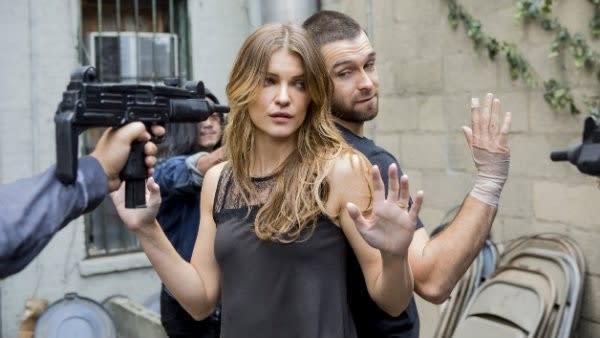'Banshee': Still The Best Action Show On TV

Banshee is back for a fourth and final season, and you’ll forgive me if I didn’t review the premiere in a timely fashion last week — I was still mourning the death of Rebecca Bowman, the show’s most morally vexing object of desire and strength. (It was a death we had to piece together from the two-year time-jump the show has taken.) Rebecca’s mixture of wounded-child moroseness; her creepy relationship with her uncle, now-mayor of Banshee, Penn., Kai Proctor; her unaccountable prowess as a street fighter and wielder of guns bigger than her arms — there was just so much to miss about Rebecca. Fortunately, Banshee knew this and gave us plenty of Rebecca flashbacks, including her rescue of our ostensible hero, Lucas Hood, from a life he seemed resigned to spending in a cabin, drinking himself senseless whenever he wasn’t picking lice out of an appallingly scraggly beard.
The initial narrative questions propelling the new season are, who killed Rebecca, and is Job (not seen since last season’s suspenseful end) still alive? Banshee proceeds with its own logic, which can often seem illogical. It spent the premiere last week setting up certain new facts: Brock is now the town sheriff, Proctor-as-mayor is Brock’s boss and oppressor, and Carrie is seeing a therapist to get past the death of her husband and to deal with her anger issues even as she keeps a small arsenal of weapons in her house.
This week, we will learn more about Proctor’s ever-expanding criminal businesses, spend more time with the delightfully nasty neo-Nazi Calvin Bunker, enjoy a few more Rebecca flashbacks, and a couple more details I will not spoil. Just around the corner: an FBI agent played by Eliza Dushku, whose cult-show credentials (Buffy, Angel, Dollhouse) are impeccably right for Banshee.
The series remains the best action show on TV by far. Its fight scenes are as well-choreographed and as surprising in their twists and punches as anything I’ve seen on television or in the movies. Beyond that, key producer-writer-directors such as Jonathan Tropper, Greg Yaitanes, David Schickler, and OC Madsen have created a drama in which fractured chronology meets fractured bones: Banshee is a series of puzzle pieces, constantly rearranged, but it never feels like a game being played at the viewer’s expense.
Instead, its withholding of some information, and its over-sharing of much of the town’s violence, makes the experience of watching Banshee similar to that of reading a great pulp novel such as Dashiell Hammett’s Red Harvest. (The Banshee creators might have easily named their town the same as Hammett’s in that book: Poisonville.)
Tucked away on Cinemax and by now almost doggedly proud of both its cult status and its utter unpredictability, Banshee remains a pure pleasure machine, at once vulnerable and sturdy, and determined to go out on its own terms, whatever the hell those may be.
Banshee airs Friday nights at 10 p.m. on Cinemax.

